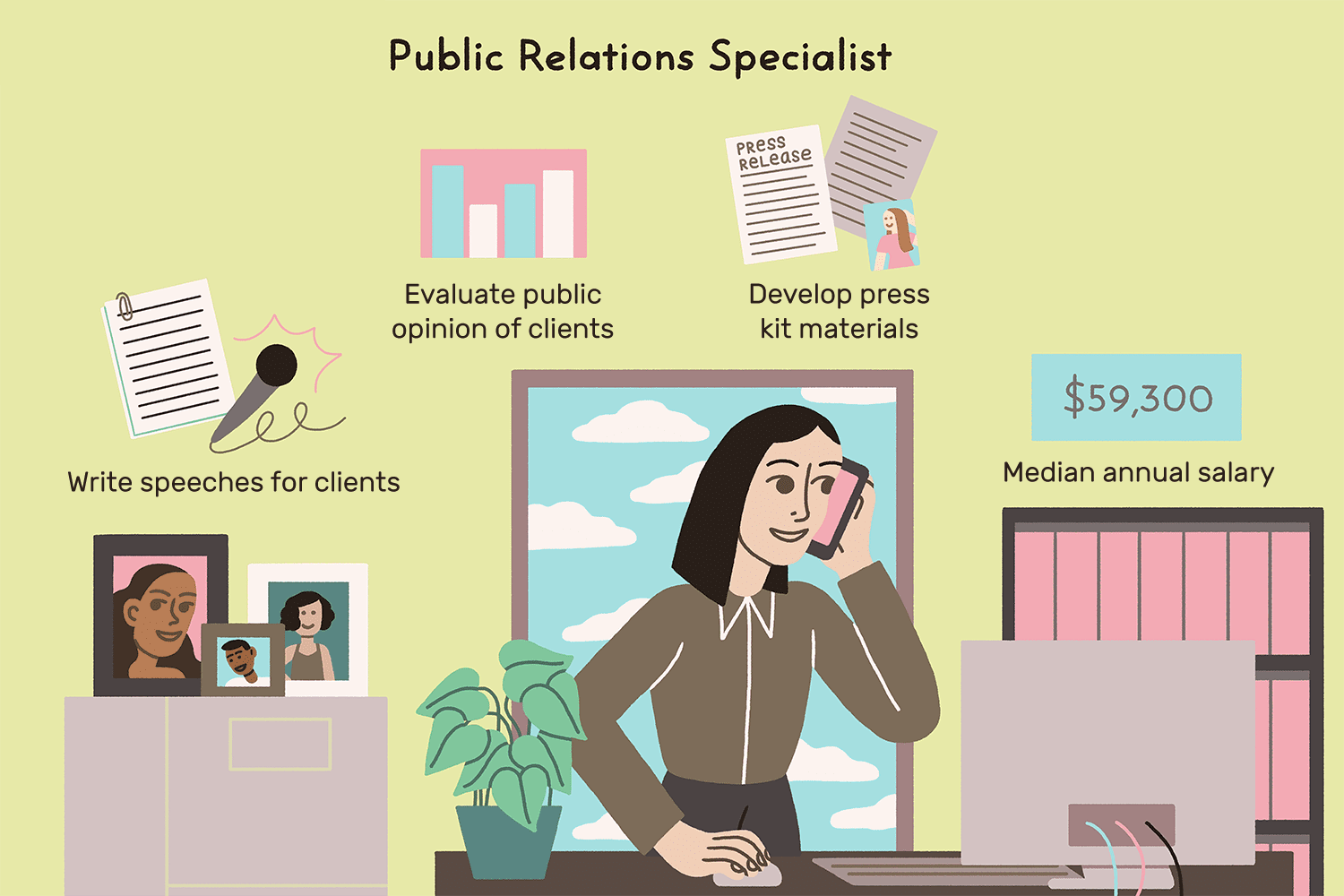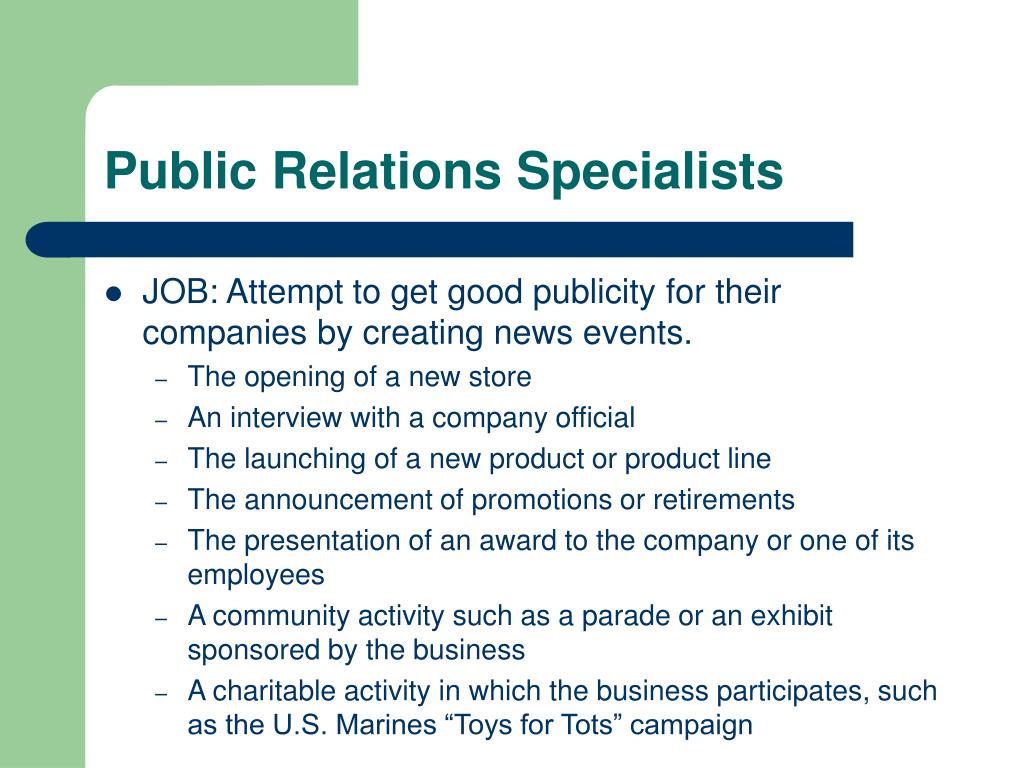
Public relations specialists are the architects of perception What Is One Thing A Public Relations Specialist Do, wielding the tools necessary to shape and maintain a favorable public image for individuals, organizations, or brands. Their multifaceted role revolves around fostering meaningful connections between their clients and the public, navigating the intricate landscape of media, communication, and public opinion.
Moreover, these specialists are skilled in crisis management, adeptly handling challenging situations to mitigate damage and protect their clients' reputations. Whether through press releases, media outreach, social mediastrategies, or event planning, they orchestrate campaigns that convey the right messages at the right time, fostering positive relationships and reinforcing their clients' brand identities.
What Is A Public Relations Specialist?
A Public Relations Specialistis a communications expert who helps individuals, organizations, and brands manage their public image and build positive relationships with their key audiences. They play a crucial role in shaping public perception, influencing opinions, and protecting reputations.
Being a Public Relations Specialist offers a variety of benefits, both personal and professional. Here are some key advantages to consider:
Personal Benefits
- Intellectual challenge and variety -PR involves creativity, problem-solving, and strategic thinking. You'll work on diverse projects across different industries, constantly learning and expanding your knowledge.
- Strong communication and interpersonal skills -PR requires effective communication, both written and verbal. You'll hone your skills in building relationships, influencing others, and crafting compelling messages.
- Sense of purpose and impact -PR can make a real difference, shaping public perception, building brand reputation, and even influencing policy. You'll have the satisfaction of knowing your work contributes to a larger purpose.
- Dynamic and fast-paced environment - The PR world is constantly evolving, keeping you on your toes and energized. You'll stay updated on current trends and adapt your skills to new challenges.
- Networking opportunities -You'll interact with diverse individuals from various industries, including journalists, influencers, and executives. This broadens your network and opens doors to future careeropportunities.
Professional Benefits
- Career growth and advancement - PR is a growing field with high demand for skilled professionals. You'll have ample opportunities for career progression, moving into leadershiproles or specializing in specific areas like crisis communication or digital PR.
- Competitive salary and benefits - PR professionals tend to earn competitive salaries and enjoy good benefits packages. Depending on your experience and expertise, you can command a high income in this field.
- Job security - PR skills are valuable across various industries, providing you with job security and flexibility to switch between companies or sectors.
- Travel and international exposure - Depending on your role, you may have the opportunity to travel for conferences, events, or client meetings, broadening your horizons and international experience.
- Job satisfaction and fulfillment -PR can be a rewarding career, offering a sense of accomplishment and satisfaction from seeing your work positively impact brands and communities.
7 Key Roles Of Public Relations Specialist
Public relations specialists play a crucial role in managing the public perception of an organization, individual, or brand. They are responsible for crafting and disseminating positive messaging, building relationships with key stakeholders, and handling crises that can damage reputations. Here are seven key roles of a public relations specialist:
1. Measuring And Evaluating Results
Public relations specialists track the effectiveness of their campaigns and measure the impact of their efforts on the client's reputation and brand awareness. They use metrics such as media coverage, website traffic, and social media engagement to assess their performance and make data-driven decisions.
2. Crafting Crisis Communication Plans
Public relations specialists develop and implement crisis communication plans to help their clients manage negative situations and protect their reputations. They identify potential risks, establish protocols for responding to crises, and provide guidance during challenging times.
3. Creating And Managing Social Media Presence
Public relations specialists establish and maintain their clients' social media presence. They develop engaging content, manage community interactions, and promote the client's brand across various social media platforms.
4. Monitoring Public Sentiment
Public relations specialists track online conversations, social media mentions, and news coverage related to their clients. They analyze this data to identify trends, assess public opinion, and develop strategies to address any potential issues.
5. Managing Media Relations
Public relations specialists respond to media inquiries, arrange interviews, and facilitate media coverage for their clients. They also handle sensitive situations, such as product recalls or negative press, to minimize damage to the client's reputation.
6. Building Relationships With Key Stakeholders
Public relations specialists cultivate relationships with journalists, influencers, and other individuals who can amplify their clients' messages. They network, attend industry events, and engage with relevant media outletsto build trust and credibility.
7. Crafting And Disseminating Positive Messaging
Public relations specialists develop and distribute press releases, media pitches, and other forms of communication to promote their clients' positive stories and accomplishments. They ensure that the messaging is clear, concise, and aligned with the client's overall goals.
Things PR Specialists Do On A Regular Basis
- Attend industry events to network with potential clients and partners.
- Develop and implement public relations campaigns to promote the client's brand.
- Create and distribute crisis communication plans to help the client manage negative situations.
- Track and analyze media coverage to measure the effectiveness of PR campaigns.
PR specialists play an important role in helping organizations manage their public image and reputation. They are responsible for crafting and communicating messages that influence public opinion, raise awareness, and drive engagement. If you are looking for a challenging and rewarding career in communications, then public relations may be a good fit for you.
Types Of Public Relations Specialists
The world of Public Relations (PR) is diverse and offers a variety of specializations, each with its own unique focus and skillset. Here are some key types of Public Relations specialists:
1. Media Relations Specialists
- Focus - Building relationships with journalists and media outlets to secure positive coverage for their clients.
- Skills - Strong writing and communication skills, media outreach and pitching, crisis communication.
2. Corporate Communications Specialists
- Focus -Managing internal and external communication for organizations, including employee communication, investor relations, and brand messaging.
- Skills -Strategic communication planning, message development, internal communications strategies, crisis communication.
3. Crisis Communications Specialists
- Focus - Helping organizations manage negative publicity and crises, protecting their reputation and restoring public trust.
- Skills -Crisis management planning, media relationsunder pressure, spokesperson training, message control.
4. Social Media Specialists
- Focus - Developing and executing social media strategies to engage audiences, build brand awareness, and drive results.
- Skills -Social media platform expertise, content creation, community management, data analysis.
5. Digital Public Relations Specialists
- Focus -Leveraging digital channels and platforms to promote organizations and their messages, including online reputation management and influencer marketing.
- Skills - SEOand content marketing, digital storytelling, influencer outreach, website management.
6. Public Affairs Specialists
- Focus - Building relationships with government officials and advocating for policies that benefit their clients.
- Skills - Policy analysis, lobbying, political communication, grassroots organizing.
7. Investor Relations Specialists
- Focus - Communicating with investors and analysts to maintain a positive investor climate and secure funding.
- Skills -Financial communication, investor presentations, financial analysis, regulatory compliance.
What Skills Are Needed To Be A Public Relations Specialist?
Public relations specialists play a crucial role in managing the public image and reputation of individuals, organizations, or brands. To excel in this field, a combination of strong communication, interpersonal, and strategic skills is essential. Here's a comprehensive overview of the key skills required to be a successful public relations specialist:
1. Core Communication Skills
- Active Listening Skills -Public relations specialists must be able to listen attentively to understand the needs and concerns of their clients and stakeholders. They should be empathetic and able to build rapport with others to establish trust and credibility.
- Effective Verbal Communication Skills -Public relations specialists must be able to articulate their thoughts and ideas clearly and confidently, both in person and over the phone. They should be able to engage with journalists, influencers, and other stakeholders in a professional and persuasive manner.
- Excellent Writing Skills -Public relations specialists must be able to craft clear, concise, and compelling messages tailored to different audiences. They should have a strong grasp of grammar, syntax, and style to produce effective press releases, media pitches, and other forms of communication.
2. Interpersonal And Networking Skills
- Cultural Sensitivity and Diversity Awareness -Public relations specialists must be sensitive to cultural differences and perspectives when crafting messages and engaging with diverse audiences. They should be aware of potential biases and ensure their communication is inclusive and respectful.
- Collaboration and Teamwork Skills -Public relations specialists often work as part of a team, collaborating with colleagues, clients, and external partners. They should be able to work effectively within a team environment, sharing ideas and contributing to collective goals.
- Strong Relationship Building Skills -Public relations specialists must be able to cultivate and maintain relationships with key stakeholders, including journalists, influencers, industry experts, and potential clients. They should be adept at networking and building rapport to expand their professional network.
3. Strategic Thinking And Analytical Skills
- Data Analysis and Evaluation Skills -Public relations specialists should be able to collect, analyze, and interpret data to measure the effectiveness of their campaigns and identify areas for improvement. They should be familiar with metrics such as media coverage, social media engagement, and website traffic.
- Social Media Savvy -Public relations specialists must be proficient in using social media platforms to promote their clients' brands and engage with their target audiences. They should be able to create engaging content, manage social media communities, and monitor online conversations.
- Media Relations Expertise -Public relations specialists must have a strong understanding of the media landscape and how toeffectively reach and engage with journalists. They should be able to pitch stories, arrange interviews, and facilitate media coverage.
- Problem-Solving and Crisis Management Skills -Public relations specialists must be able to identify potential issues and develop strategies to mitigate negative situations. They should be able to think critically and make sound decisions under pressure, especially during crises.
What Does The Future Hold For The Field Of Public Relations?
The future of public relations is brimming with exciting possibilities, driven by the ever-evolving media landscape and the growing importance of authenticity and transparency. Here are some key trends shaping the PR landscape of tomorrow:
1. The Rise Of Data-Driven PR
Gone are the days of gut feelings and guesswork. PR will become increasingly data-driven, with professionals leveraging analytics and audience insights to measure the effectiveness of campaigns and tailor strategies for maximum impact. Think advanced social listeningtools, sentiment analysis, and campaign performance dashboards that provide real-time data and actionable insights.
2. Embracing AI And Automation
Artificial intelligence (AI) and automation will play a bigger role in PR, freeing up professionals for more strategic tasks. AI-powered tools can automate tasks like media monitoring, content creation, and social media scheduling, allowing PR teams to focus on building relationships, crafting compelling narratives, and managing crises effectively.
3. Micro-Influencers And Hyper-Personalization
The era of mass marketing is fading. PR will shift towards micro-influencers with engaged, niche audiences and hyper-personalized content that resonates deeply with specific segments. This requires a deep understanding of your target demographics and the ability to tailor messaging and communication accordingly.
4. Building Trust And Transparency
In an age of misinformation and fake news, building trust and transparency will be paramount for PR professionals. Consumers are increasingly skeptical and demand genuine, authentic communication from brands. Transparency in communication, ethical storytelling, and a focus on social responsibility will be key differentiators for successful PR campaigns.
5. Embracing New Communication Channels
The PR toolbox will expand beyond traditional media relations. PR professionals will need to master new communication channels like live streaming, podcasts, and social media platforms like TikTok and Clubhouse to reach and engage target audiences effectively.
6. Measuring The Impact Of PR
PR will move beyond measuring just media coverage and brand mentions. Professionals will need to demonstrate the real-time businessimpact of their efforts, showcasing how PR campaigns contribute to brand awareness, customer engagement, and ultimately, revenue growth.
FAQ's About What Is One Thing A Public Relations Specialist Do?
What Do You Do As A Public Relations Specialist?
Public relations specialists create and maintain a positive public image for the individuals, groups, or organizations they represent. They craft media releases and develop social media programs to shape public perception of their clients and to increase awareness of each client's work and goals.
What Is An Example Of A PR Specialist?
For example, a PR professional may work at an accounting firm, promoting a positive public image of the entire organization. They may also work at a large techcompany where they represent the company's artificial intelligence (AI) division.
Is A Public Relations Specialist A Good Career?
They generally work behind the scenesto help build a strong relationship between their client or organization and the public. Public relations careersare often lucrative, and many PR professionals find their work challenging and rewarding.
Conclusion
The role of a public relations specialist transcends mere communication; it encapsulates the art of influence and reputation management. They are the custodians of a brand's image, using their strategic prowess to navigate through the complexities of public perception and media dynamics. Through storytelling, crisis management, and a profound understanding of audience engagement, these specialists craft narratives that resonate deeply, fostering connections that endure beyond fleeting moments.
In an age where reputation holds immense value, the work of a PR specialist is indispensable. They are the architects behind successful brand narratives, entrusted with the task of not only maintaining but also elevating the reputations of those they represent. Their ability to shape public opinion, build credibility, and navigate the ever-evolving media landscape solidifies their position as essential catalysts for sustained success in today's competitive and interconnected world.

